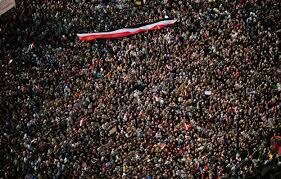
[ES]
2011 no solo fue el año de las revueltas del Mediterráneo, sino también el comienzo de la primavera global. Desde entonces estamos asistiendo a la emergencia de movimientos sociales en los que las redes juegan un papel importante. Éstos tienen una serie de características que apuntan a múltiples y complejas perspectivas nuevas para analizar y comprenderlos. Los movimientos sociales en red, o los movimientos red, tal y como los hemos nombrado inicialmente, están en estrecha relación con las redes de comunicación, debido a su carácter abierto y permeable, y su capacidad de transformarse a sí mismos a una gran velocidad.
Los movimientos red parecen tener impactos reales y profundos en las sociedades que emergen. Al mismo tiempo, existen relaciones significativas entre estos movimientos que surgen en diferentes países y que nos impulsan a mirar en su dimensión relacional. Primero fue la Plaza Tahrir y la imaginación de la revolución en Egipto y Túnez, y las movilizaciones en el sur de Europa como Grecia o Portugal en 2010, inspiraron al movimiento 15M y sus acampadas en España. Después de eso, 15M actuó como un catalizador para las etapas iniciales del movimiento Occupy Wall Street. Más tarde, las explosiones en México, Brasil y Turquía tenían una gran cantidad de referencias a los movimientos anteriores. En este contexto, es oportuno y pertinente analizar estos movimientos desde su compleja perspectiva.
Este proyecto tiene como objetivo realizar un análisis en profundidad de dos movimientos red seleccionados: 15M en España y Occupy Wall Street en EE UU. Vamos a realizar un análisis en dos niveles que tenga en cuenta las particularidades de cada país. En primer lugar, vamos a analizar las características, la composición y los efectos de cada movimiento. En segundo lugar, vamos a compararlos con ello a comprender su dinámica y su evolución desde una perspectiva internacional.
[EN]
2011 is not only the year of the Mediterranean revolts, but the beginning of the global spring. Since then we are witnessing the emergence of social movements in which networks play an important role. These have a number of characteristics that point to multiple and complex new perspectives to analyze and understand them. The social network movements, or network movements as we have decided initially to name them, are in close relation with communication networks, due to their open and permeable character, and their ability to transform themselves at a fast speed.
Network movements seem to have real and deep impacts in the societies they emerge from. At the same time there are significant relations among these movements in different countries that push us to start looking at them in their relational dimension. First it was the Tahrir Square and the imagination of the revolution in Egypt and Tunisia, and the mobilizations in South Europe as Greece or Portugal on 2010, inspiring the 15M movement and its camps in Spain. After that, 15M acted as a catalyst for the initial steps of the Occupy Wall Street movement. Later, the explosions in Mexico, Brazil and Turkey had a lot of references to the previous movements. Within this context, it is timely and relevant to analyze these movements from its complex perspective.
This project aims to conduct an in depth analysis of two selected network movements: 15M in Spain and Occupy Wall Street in the US. We will conduct a double level analysis that will take into account the particularities of each country. First, we will analyze the characteristics, composition and impacts of each movement. Second, we will compare them so to understand their dynamics and their evolution from an international perspective.

